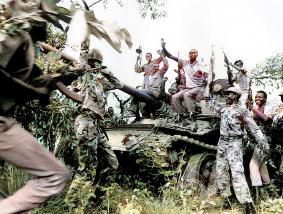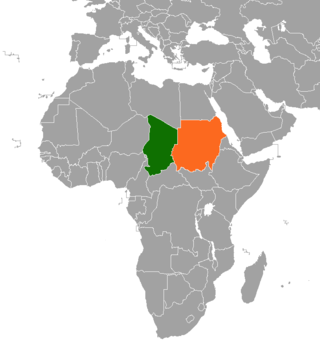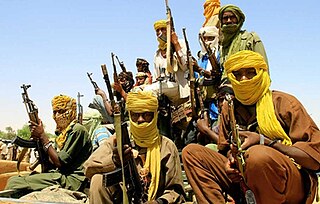| |||||
| Decades: | |||||
|---|---|---|---|---|---|
| See also: | Other events of 1998 History of Sudan | ||||
The following lists events that happened during 1998 in Sudan .
| |||||
| Decades: | |||||
|---|---|---|---|---|---|
| See also: | Other events of 1998 History of Sudan | ||||
The following lists events that happened during 1998 in Sudan .
Chad, officially the Republic of Chad, is a landlocked country in Central Africa. It borders Libya to the north, Sudan to the east, the Central African Republic to the south, Cameroon and Nigeria to the southwest, and Niger to the west. Due to its distance from the sea and its largely desert climate, the country is sometimes referred to as the "Dead Heart of Africa".

Omar Hassan Ahmad al-Bashir is a Sudanese former military officer and politician who served as Sudan's head of state under various titles from 1989 until 2019, when he was deposed in a coup d'état. He was subsequently incarcerated, tried and convicted on multiple corruption charges. He came to power in 1989 when, as a brigadier general in the Sudanese Army, he led a group of officers in a military coup that ousted the democratically elected government of prime minister Sadiq al-Mahdi after it began negotiations with rebels in the south; he subsequently replaced President Ahmed al-Mirghani as head of state. He was elected three times as president in elections that have been under scrutiny for electoral fraud. In 1992, al-Bashir founded the National Congress Party, which remained the dominant political party in the country until 2019. In March 2009, al-Bashir became the first sitting head of state to be indicted by the International Criminal Court (ICC), for allegedly directing a campaign of mass killing, rape, and pillage against civilians in Darfur. On 11 February 2020, the Government of Sudan announced that it had agreed to hand over al-Bashir to the ICC for trial.
The Janjaweed are an Arab nomad militia group operating in the Sahel region that operates in Sudan, particularly in Darfur and eastern Chad. They have also been speculated to be active in Yemen. According to the United Nations definition, Janjaweed membership consists of Arab nomad tribes from the Sahel, the core of whom are Abbala Arabs, traditionally employed in camel herding, with significant recruitment from the Baggara.

The Second Sudanese Civil War was a conflict from 1983 to 2005 between the central Sudanese government and the Sudan People's Liberation Army. It was largely a continuation of the First Sudanese Civil War of 1955 to 1972. Although it originated in southern Sudan, the civil war spread to the Nuba mountains and the Blue Nile. It lasted for almost 22 years and is one of the longest civil wars on record. The war resulted in the independence of South Sudan 6 years after the war ended.

Salva Kiir Mayardit, commonly known as Salva Kiir, is a South Sudanese politician who has been the President of South Sudan since its independence on 9 July 2011. Prior to independence, he was the President of the Government of Southern Sudan, as well as First Vice President of Sudan, from 2005 to 2011. He was named Commander-in-Chief of the Sudan People's Liberation Army (SPLA) in 2005, following the death of John Garang.

The Chadian Civil War of 2005–2010 began on December 18, 2005. Since its independence from France in 1960, Chad has been swamped by civil wars between the Arab-Muslims of the north and the Sub-Saharan-Christians of the south. As a result, leadership and presidency in Chad drifted back and forth between the Christian southerners and Muslim northerners. When one side was in power, the other side usually started a revolutionary war to counter it.
The Battle of N'Djamena took place between the forces of the revolutionary United Front for Democratic Change (UFCD) and the military of Chad that occurred on 13 April 2006 when rebel forces launched an assault on the capital of Chad in the pre-dawn hours, attempting to overthrow the government of President Idriss Déby Itno from their bases an estimated thousand miles east.

The War in Darfur, also nicknamed the Land Cruiser War, was a major armed conflict in the Darfur region of Sudan that began in February 2003 when the Sudan Liberation Movement (SLM) and the Justice and Equality Movement (JEM) rebel groups began fighting against the government of Sudan, which they accused of oppressing Darfur's non-Arab population. The government responded to attacks by carrying out a campaign of ethnic cleansing against Darfur's non-Arabs. This resulted in the death of hundreds of thousands of civilians and the indictment of Sudan's president, Omar al-Bashir, for genocide, war crimes, and crimes against humanity by the International Criminal Court.
The period from 2000 to 2006 of the Lord's Resistance Army insurgency in northern Uganda begins with the assault of the Uganda People's Defence Force (UPDF) upon LRA strongholds in South Sudan. This in turn led to a series of retaliatory attacks by the Lord's Resistance Army of an intensity not seen to since the mid-1990s. International awareness of the conflict gradually grew and in September 2005, the International Criminal Court issues warrants for the arrest of senior LRA commanders, including Joseph Kony.

While there is a consensus in the international community that ethnic groups have been targeted in Darfur and that crimes against humanity have therefore occurred, there has been debate in some quarters about whether genocide has taken place there. In May 2006, the International Commission of Inquiry on Darfur organized by United Nations "concluded that the Government of the Sudan has not pursued a policy of genocide ... [though] international offences such as the crimes against humanity and war crimes that have been committed in Darfur may be more serious and heinous than genocide." Eric Reeves, a researcher and frequent commentator on Darfur, has questioned the methodology of the commission's report.

Sudan–United States relations are the bilateral relations between Sudan and the United States. The United States government has been critical of Sudan's human rights record and has dispatched a strong UN Peacekeeping force to Darfur. Relations between both countries in recent years have greatly improved, with Sudan's post-revolutionary government compensating American victims of al-Qaeda terror attacks, the removal of Sudan from the State Department's blacklist of state sponsors of terrorism and the United States Congress having reinstated Sudan's sovereign immunity in December 2020.

The populations of eastern Chad and western Sudan established social and religious ties long before either nation's independence, and these remained strong despite disputes between governments. In recent times, relations have been strained due to the conflict in Darfur and a civil war in Chad, which both governments accuse the other of supporting.

The Sudanese conflict in South Kordofan and Blue Nile was an armed conflict and insurgency in the Sudanese states of South Kordofan and Blue Nile between the Sudanese Armed Forces (SAF) and the Sudan People's Liberation Movement–North (SPLM-N), a northern affiliate of the Sudan People's Liberation Movement (SPLM) in South Sudan. After some years of relative calm following the 2005 agreement which ended the second Sudanese civil war between the Sudanese government and SPLM rebels, fighting broke out again in the lead-up to South Sudan independence on 9 July 2011, starting in South Kordofan on 5 June and spreading to the neighboring Blue Nile state in September. SPLM-N, splitting from newly independent SPLM, took up arms against the inclusion of the two southern states in Sudan with no popular consultation and against the lack of democratic elections. The conflict is intertwined with the War in Darfur, since in November 2011 SPLM-N established a loose alliance with Darfuri rebels, called Sudan Revolutionary Front (SRF).

South Sudan, officially the Republic of South Sudan, is a landlocked country in East Africa. It is bordered on the north by Sudan; on the east by Ethiopia; on the south by the Democratic Republic of the Congo, Uganda and Kenya; and on the west by the Central African Republic. South Sudan's diverse landscape includes vast plains and plateaus, dry and tropical savannahs, inland floodplains, and forested mountains. The Nile River system is the defining physical feature of the country, running south to north across its center, which is dominated by a large swamp known as the Sudd. South Sudan has a population of 12.7 million. Juba is the capital and largest city.
Ethnic violence in South Sudan has a long history among South Sudan's varied ethnic groups. South Sudan has 64 tribes with the largest being the Dinka, who constitute about 35% of the population and predominate in government. The second largest are the Nuers. Conflict is often aggravated among nomadic groups over the issue of cattle and grazing land and is part of the wider Sudanese nomadic conflicts.

The South Sudanese Civil War was a multi-sided civil war in South Sudan fought from 2013 to 2020, between forces of the government and opposition forces. The Civil War caused rampant human rights abuses, including forced displacement, ethnic massacres, and killings of journalists by various parties. Since its end South Sudan has been governed by a coalition formed by leaders of the former warring factions, Salva Kiir Mayardit and Riek Machar. The country continues to recover from the war while experiencing ongoing and systemic ethnic violence.

The Libyan civil war (2014–2020), also known as the Second Libyan Civil War, was a multilateral civil war which was fought in Libya among a number of armed groups, but mainly the House of Representatives (HoR) and the Government of National Accord (GNA), for six years from 2014 to 2020.

The Rapid Support Forces is a paramilitary force formerly operated by the government of Sudan. The RSF grew out of, and is primarily composed of, the Janjaweed militias which previously fought on behalf of the Sudanese government. Its actions in Darfur were deemed crimes against humanity by Human Rights Watch.
The following lists events that happened during 1998 in Libya.
The following lists events that happened during 1998 in the Democratic Republic of the Congo.